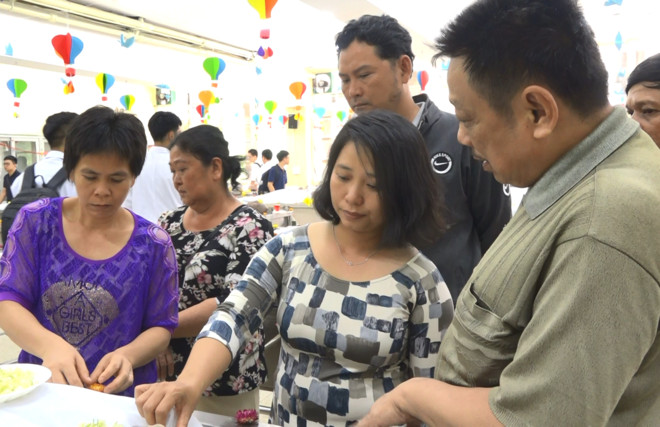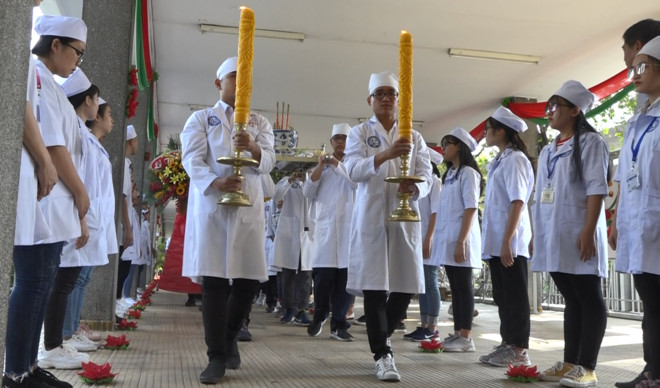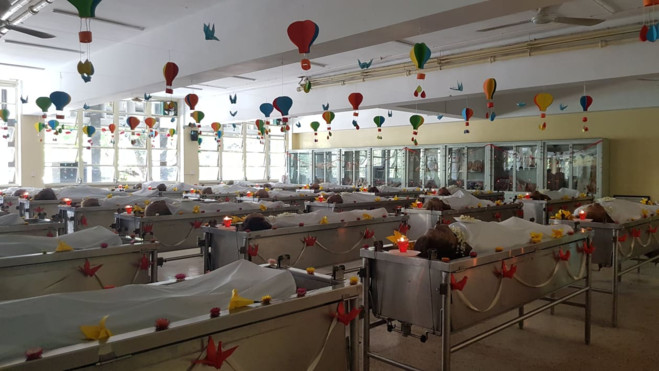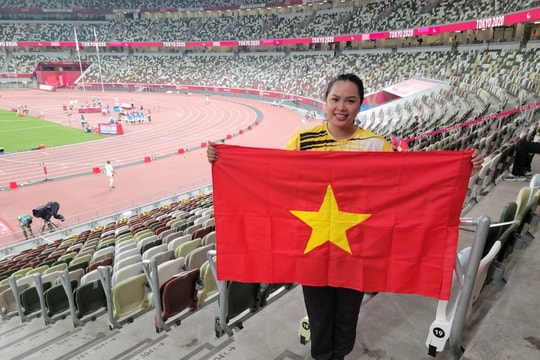A family of three in Dong Thap donated their bodies after death.
Ms. Xuan stood still for a long time, gently placing grapefruit and chrysanthemum petals on the bodies of her father and uncle at the Macchabeés ceremony on the afternoon of January 16.
Chrysanthemums, lilies, paper lotuses and countless cranes lined the corridors of the University of Medicine and Pharmacy in Ho Chi Minh City on the afternoon of January 16. The bodies were solemnly placed in a warm space of flower lights, with flower necklaces around their necks. Hundreds of medical students respectfully lined up to pay their respects to those who donated their bodies to medicine, in the sacred atmosphere of the Macchabeé Ceremony.
Joining the teachers, students, and relatives of those who donated their bodies, Ms. Phan Thi Thuy Xuan could not contain her emotions.
"I used to stand here as my grandfather's relative, now I'm my father's and uncle's relative," the 35-year-old teacher choked up.
|
Ms. Xuan (middle) next to her father's body. Photo:Le Phuong |
Three months ago, Ms. Xuan's father passed away at the age of 60 due to cancer. His body was donated to science and taken to the University of Medicine and Pharmacy in Ho Chi Minh City. Two days later, Ms. Xuan's uncle suddenly passed away after a stroke and was also brought to school to "be a silent teacher" with his brother.
"My father fought cancer for exactly 5 months. During the week waiting for the hospital's test results, instead of worrying about finding out about his condition, he eagerly contacted to ask about the body donation file he had sent earlier," said Ms. Xuan.
When the doctor suggested removing his entire stomach and esophagus, he refused because he knew that removing them would only sustain his life and not cure his illness. "My father said he had made a wish to donate his body, so he had to keep all his organs intact. For months, he was tormented by illness, unable to eat or drink, and severely exhausted, but he remained steadfast to the end," said Ms. Xuan.
9 years ago, Ms. Xuan's grandmother was a pioneer in body donation. The poor woman, who worked in the fields all year round, came from Dong Thap to Ho Chi Minh City to submit her application. At that time, body donation was still strange, when she passed away, many of her children and grandchildren did not agree. After several hours of debate, everyone agreed to call the body receiving department to carry out her last wish, luckily it was still in time within the first 8 hours.
Understanding more about her act of "giving her body as a gift for life", Ms. Xuan's family currently has 12 people who have submitted applications to donate their bodies after death. She is also the guide, bringing the application from her hometown to Ho Chi Minh City to submit on behalf of 56 relatives, neighbors, and friends, to fulfill the wish not to stop life when taking the last breath.
"Neighbors and relatives used to think that the family donated their bodies to make money, so they gossiped about them. Now everyone understands that this is a completely voluntary act, fulfilling the wish to donate one's body to science," Ms. Xuan confided.
|
Students of Ho Chi Minh City University of Medicine and Pharmacy at the ceremony to honor those who donated their bodies to medicine on the afternoon of January 16. Photo:Le Phuong |
Dr. Nguyen Hoang Vu, Head of the Department of Anatomy, University of Medicine and Pharmacy, Ho Chi Minh City, said that in 2018, 835 people came to register to donate their bodies. Up to now, a total of 28,960 people have registered to donate their bodies. Last year, the school received 21 bodies, bringing the total number of bodies to date to 781.
The school currently preserves 128 bodies for medical education and research. For the bodies used for teaching and research, around July every year, the school cremates them and returns the ashes to their families.
"We, the teachers and students of the medical profession, always respect the bodies of volunteers. They are the 'Silent Teachers', the 'Immortal Flowers' that throughout their lives of learning and practicing, students and doctors always carry a heavy debt of gratitude," Dr. Vu shared. The kindness and noble sacrifice of volunteers are very close and very real examples, the first lesson in medical ethics education for medical students.
|
The bodies are placed at the Department of Pathology, University of Medicine and Pharmacy, Ho Chi Minh City. Photo:Le Phuong |
From the 16th century, anatomy developed into an important subject, dissection became popular and compulsory in medical schools. Doctors took the initiative, turning the spirit of gratitude into the annual Macchabeé ceremony on Christmas, organizing dances to thank those who had sacrificed their lives for science.




.jpg)

